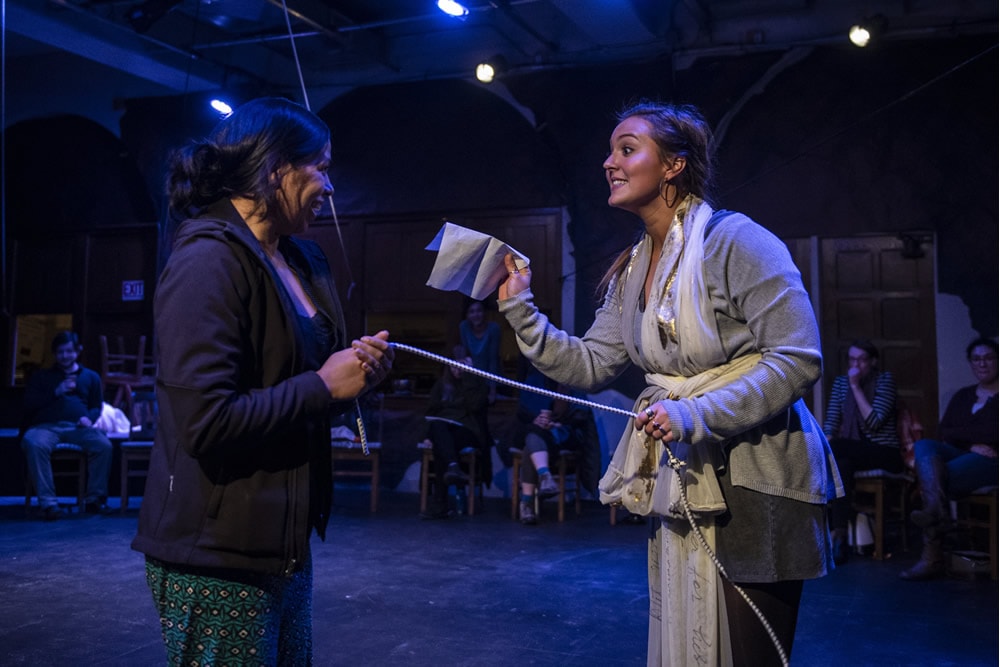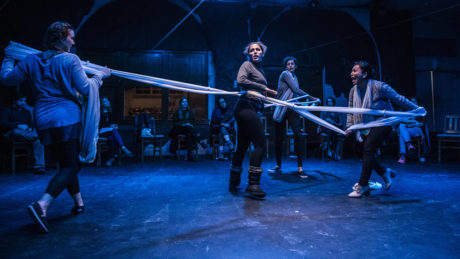From the moment the audience enters the large square room that is Spooky Action Theater’s church basement home, Environmental Designer Colin K. Bills has already communicated to the audience for In This Hope: A Pericles Project the invitation to interact. The chairs have been arranged in a wide circle, with but a few gaps for egress – every seat is a front row seat, and one must look over the heads of other audience members to read the names of ancient Mediterranean cities off walls painted to in the faded colors of an antiquarian map. Ropes extend over the audience’s heads. Four actors, Lida Maria Benson, Rocelyn Frisco, Raghad Makhlouf, and Lori Pitts, file in dressed in black leggings and gray sweaters, introducing themselves by their first names.

The Welders are a collective of local playwrights generating and producing their own work. Welders member Hannah Hessel Ratner, along with her collaborators, has chosen to explore one of Shakespeare’s more obscure plays, Pericles – which for whatever reason, was not one of the plays anthologized in the 1623 First Folio. Ratner is no stranger to the Bard as she serves as Audience Enrichment Manager at the Shakespeare Theatre Company.
Scholarly consensus on Pericles is that it was a collaboration between Shakespeare and the lesser known George Wilkins, an innkeeper and an alleged pimp by profession, who wrote the first two acts – Shakespeare set much of the fourth act in a brothel. As with much of the Shakespearean canon, it is an adaptation from another source, in this case, not from the history of Athens, but 14th-century English poet John Gower’s tale of a fictitious King of Tyre (a Phoenician city in modern-day Lebanon). Just as Shakespeare and Wilkins acknowledge Gower by including him as a narrator in the play, the actors in In This Hope credit him as they discuss the sources.
In the original, Pericles (Makhlouf) has traveled to Antioch, hoping to marry the daughter of its ruler, King Antiochus (Frisco), but discovers that his unnamed fiancé (Pitts) is in an incestuous relationship with her father, and upon discovering the secret, flees, pursued by an assassin (Benson) across the waters until he washes up at his next port of call.
Instead of retelling the story with a modern twist, Ratner, perhaps drawing on her training and experience as a dramaturg, has opened it up as a ritual on storytelling and memory. So she has Pitts stepping out of her role and reflecting how in the original play, Antiochus’ daughter had no name and only two lines of iambic pentameter. What are we to make of this in our era when we are being asked to listen to and believe women’s descriptions of abuse?
As we ponder our own answers, Pericles soon finds himself again far from home, shipwrecked on the coast of the Libyan Pentapolis. This city’s king, Simonides (Frisco, again) and his daughter, Thaisa (Pitts) welcome him, and host a ball, where the audience is invited both to share stories and to dance (Sound Designer Roc Lee draws a warm sound out of the room when music is called for). Soon, Pericles and Thaisa are happily married, but tragedy strikes again. As the royal couple return to Tyre, another storm comes, and Thaisa dies in childbirth – leaving Pitts to reflect again how maternal mortality is not a device of melodrama but a contemporary issue with political ramifications. Pericles, too traumatized to have confidence in his ability to raise a child, leaves his infant daughter, Marina (Benson) in the care of yet another noble family. Once an adult, Marina, like her father before her, is forced to flee when her hosts and guardians decide she must die as well.

Costume Designer Pei Lee has created simple loops of gauzy material that are wrapped and twisted over the actors’ bodies as they take on different characters. This minimalist approach is then extended to create stormy oceans, swaddled babies, and burial shrouds.
While they act out excerpts from Shakespeare and Wilkins the cast invite us to meditate on how memories and stories differ or how a story’s genre – whether it is comedy or tragedy – frequently comes down to the author’s often arbitrary decision of where and when the story is to begin and end. Often they delve into their own autobiographies or family histories as ways to reimagine the characters – most prominently when Makhlouf connects with her role as Pericles by retelling her experiences passing through Beirut after leaving her family home in Damascus or of the grandmother who remains. Benson connects her role as Marina, born at sea, with her own deep connection with the language, literature, dance, and political turmoil of Ukraine, the land her grandparents fled as the Iron Curtain fell over Eastern Europe. Meanwhile, Frisco reminisces about lessons in death and home cooking in the Philippines, and Pitts on being new to a town where one has few friends.
In This Hope is something of a deconstruction of how we imagine actors to work in naturalistic drama. Rather than investing their experiences to portray emotion on stage, Ratner, Director Anna Brenner, and the cast are inviting the audience to participate and compare their own personal histories to the episodes in the life of Pericles and Marina – in some ways, by modeling this engagement by revealing their own development process. Ratner, who mentions in her program notes an increasing interest in Jewish practice, is engaging in a secular theatrical midrash (after all, Shakespeare is the closest the English language has to a secular scripture) in which theater makers and theater audiences are approaching the original texts often by inserting new stories in the margins and between the lines.
In This Hope: A Pericles Project plays through December 2 at The Welders at Spooky Action Theater, 1810 16th Street NW, Washington DC. For tickets, call (202) 630-3781 or go online.




